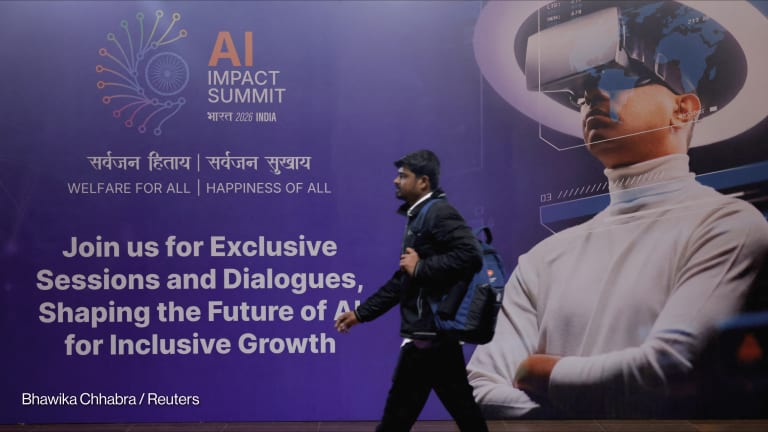Tech innovators call for better support to drive development goals
At Devex World, panelists emphasized the transformative potential of technology in driving global development, underscoring the importance of creating enabling environments to unlock this potential.
Technology holds tremendous potential to transform and accelerate global development, but innovators need enabling environments to do their work effectively. That was a key takeaway from a panel discussion at Devex World, where four leaders across geospatial data, school feeding, digital health, and renewable energy showcased transformative solutions. To meet the United Nations Sustainable Development Goals, an estimated $4.2 trillion needs to be mobilized annually, as per the Financing for Sustainable Development Report published earlier this year — a concerning increase from around $2.5 trillion per year before the COVID-19 pandemic. Technology can act as a force multiplier, driving down development costs. One powerful example is geospatial technology. Abe Tarapani, CEO of Atlas AI, said his company intends to be a “force multiplier underneath the work of so many critical social enterprises, by providing that data layer and the system of intelligence that helps to target resources and supply chains efficiently.” The Rockefeller Foundation-backed company, founded by a team from Stanford University, empowers users to leverage data for various purposes, including predicting consumer habits at the village level. These agricultural predictions can boost productivity, reduce losses, and improve agricultural efficiency — benefits that organizations like Food for Education can harness. Wawira Njiru, founder and CEO of Food for Education, initially began a school feeding program in Nairobi, Kenya, that served a few thousand children. Through technology, she streamlined the program by moving from a cash-based model to a mobile money and wristband system. “It was very hectic, it was very clunky, so we needed to find an easy way. So we used mobile money, we got the wristbands, and now we feed 450,000 children every single day,” she said. This tech-enabled approach allowed Njiru’s team to scale their impact significantly. With approximately 65 million children across Africa receiving school meals in 2019, and almost 75% of African countries implementing national school feeding policies, advancements in efficiency can have a substantial impact. Nneka Mobisson, CEO of mDoc, is leveraging technology to tackle Africa’s rise in noncommunicable diseases, or NCDs. With changing lifestyles, NCDs have become a leading cause of death, responsible for 37% of deaths in Africa in 2019, up from 24% in 2000. Mobisson founded mDoc to promote preventative care through AI-driven virtual health coaches, supported by in-person and kiosk-based services. “Today, we're serving 125,000 people across Nigeria who are really invested in becoming health literate, and we're seeing incredible outcomes,” Mobisson said, adding that mDoc’s model includes large language models for artificial intelligence coaching, enabling scalable health interventions across Africa. Supporting these technologies are data centers, crucial for digital connectivity in remote areas. With roughly 600 million Africans lacking reliable electricity, these micro data centers bring vital services to underserved areas. Scott Salandy-Defour, co-founder and CEO of LiquidStar, explained how their micro data centers in rural Africa provide energy and water to local communities. “Now, the added benefit, in addition to providing electricity, water, and internet to the people around it, is now you have this infrastructure for AI,” Salandy-Defour said. Salandy-Defour highlighted the complex funding environment tech innovators must navigate. “We've raised about $1.2 million from venture capital, and we have a 500,000 USAID contract. We've had to put together 1,200 pages for that 500,000 versus 100 pages max, including emails, for the 1.2 million,” he said. The demands, he argued, can slow progress and bog innovators down with paperwork rather than enabling them to drive change. The challenges go beyond documentation. Mobisson pointed out that supportive environments sometimes require assistance themselves. For example, while Nigeria’s government has been encouraging, it occasionally lacks the tools or information to fully support tech-based initiatives. Currency fluctuations also present challenges. mDoc users pay around 10 cents annually in Nigerian Naira, but the operating costs, especially for large language models, are in U.S. dollars, introducing financial instability. Finally, there’s the question of the private sector’s role in development efforts. As Mobisson put it, “One last piece, the distortion of market dynamics. ... How can we rethink the models of how we do investment, so those of us who are trying to deliver care ... don’t have to fight every day.”
Technology holds tremendous potential to transform and accelerate global development, but innovators need enabling environments to do their work effectively. That was a key takeaway from a panel discussion at Devex World, where four leaders across geospatial data, school feeding, digital health, and renewable energy showcased transformative solutions.
To meet the United Nations Sustainable Development Goals, an estimated $4.2 trillion needs to be mobilized annually, as per the Financing for Sustainable Development Report published earlier this year — a concerning increase from around $2.5 trillion per year before the COVID-19 pandemic.
Technology can act as a force multiplier, driving down development costs. One powerful example is geospatial technology. Abe Tarapani, CEO of Atlas AI, said his company intends to be a “force multiplier underneath the work of so many critical social enterprises, by providing that data layer and the system of intelligence that helps to target resources and supply chains efficiently.”
This story is forDevex Promembers
Unlock this story now with a 15-day free trial of Devex Pro.
With a Devex Pro subscription you'll get access to deeper analysis and exclusive insights from our reporters and analysts.
Start my free trialRequest a group subscription Printing articles to share with others is a breach of our terms and conditions and copyright policy. Please use the sharing options on the left side of the article. Devex Pro members may share up to 10 articles per month using the Pro share tool ( ).
Ayenat Mersie is a Global Development Reporter for Devex. Previously, she worked as a freelance journalist for publications such as National Geographic and Foreign Policy and as an East Africa correspondent for Reuters.








